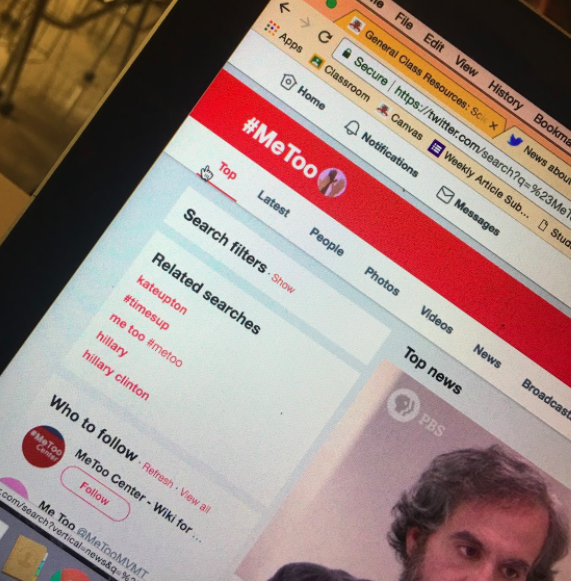Grammy Attendees Embrace “#MeToo” Movement

#MeToo trending on twitter on Arrowhead student’s laptop.
The 2018 Grammy awards, hosted by late night television host James Corden, aired live this past Sunday, January 28th at Madison Square Garden in New York City. Dating back to 1958 (grammys.com), the Grammys are an annual tradition to celebrate the year in music. This year, however, the Grammys were also able to shed the spotlight onto a different topic—the #MeToo movement.
The movement originally erupted on Twitter, in which women would gain the confidence to tell their stories and experiences of sexual harassment after they saw another one speak out. Participants of this movement who attended the Grammys wore a small white rose to represent their solidarity with victims of sexual harassment.
From Ryan Seacrest, one of E! News’ red carpet show hosts, to rapper Kendrick Lamar, who took home four Grammys (best rap album, best rap song, best rap performance, and best rap collaboration) and seven nominations, the support of the movement is “unfathomable,” according to Arrowhead senior Jordyn Gritzmacher.
“I am in complete awe of the support and attention it’s gotten strictly through social media. It seemed like every single person I watched on the red carpet was wearing a rose,” she says. “Everybody who spoke influenced positive messages to everyone listening, and I was nearly moved to tears after Ke$ha’s performance.”
Ke$ha, who has been battling in a lawsuit regarding sexual abuse with her ex-producer Lukasz Gottwald or “Dr. Luke”, performed her single inspired by her struggles entitled “Praying.” She performed alongside pop stars such as Camila Cabello, Cyndi Lauper, Julia Michaels, and Andra Day. They all wore white to represent #MeToo.
Janelle Monae, popstar and six time Grammy nominee, tweeted out the day before the ceremony (@JanelleMonae) and said, “A total of 90.7% of nominees between 2013 and 2018 were male, meaning just 9.3% were women. #TimesUp #Grammys.”
#TimesUp is a similar campaign. The message is that sexual harassment and discrimination against women has been going on for far too long and will not be tolerated anymore.
Gritzmacher says, “I think the movement is really important. As everyone is coming forward, I feel like it’s a huge realization for everyone.”
Both campaigns spread awareness of the harassment that has become more and more apparent in Hollywood in hopes of inspiring everyday people to share their stories.
The 60th annual Grammy awards aired live on CBS and a total list of all the winners can be found at grammy.com/awards.